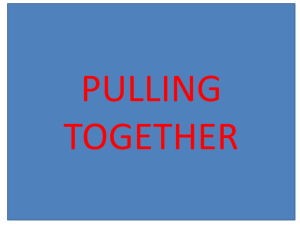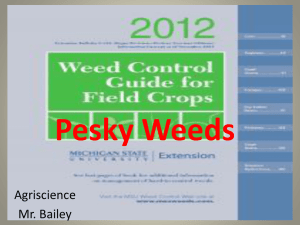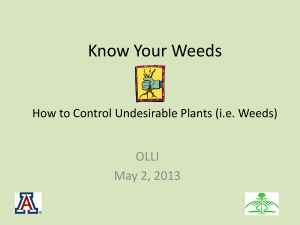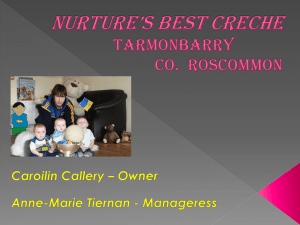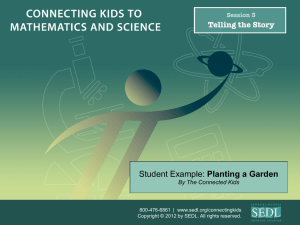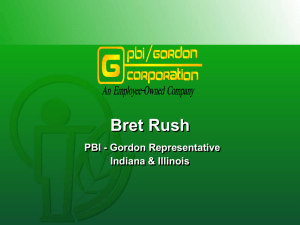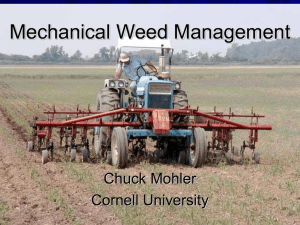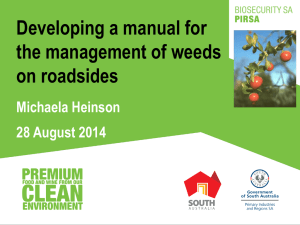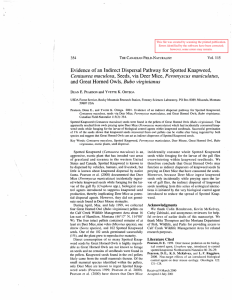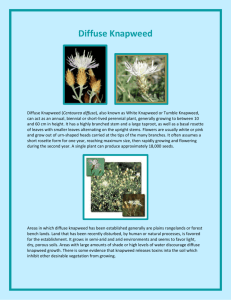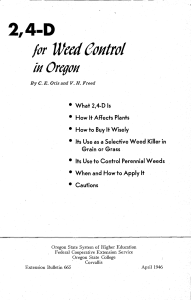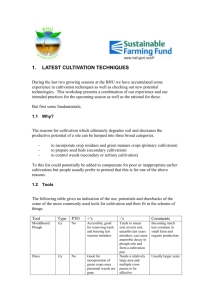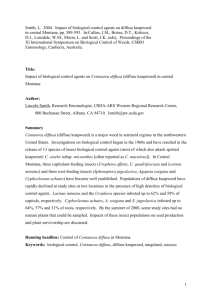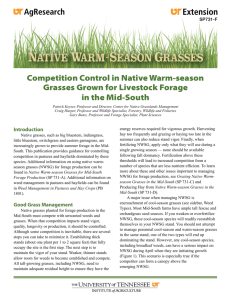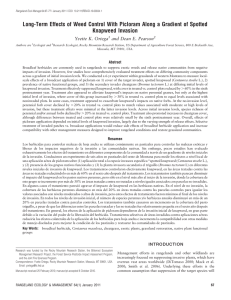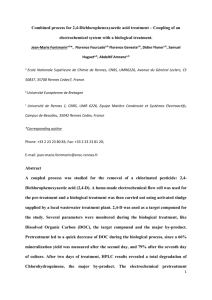Weed Management ! ? - University of Idaho Extension
advertisement
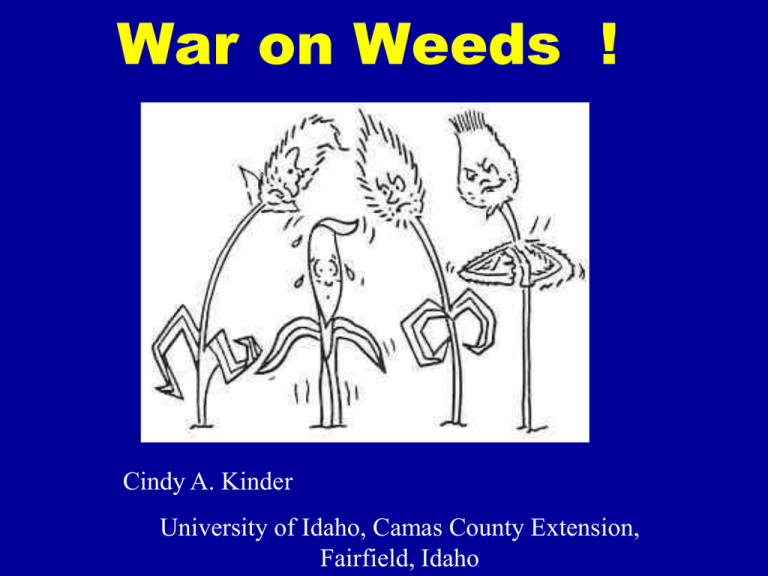
War on Weeds ! Cindy A. Kinder University of Idaho, Camas County Extension, Fairfield, Idaho Definition of Weeds A plant that is growing were it is not desired. Noxious weeds are harmful/injurious to the land, livestock and/or people by state law. Weedy Conditions Disturb the soil or ground cover Leave an opening for weeds to germinate Once established, prolific seed producers Seeds can lie dormant for many decades Long term commitment to weed management Weeds Affect everyone –Aesthetic & visual values –Decrease functions of natural ecosystem –Displace native vegetation –Decrease wildlife habitat –Increase erosion & stream sedimentation –Reduce recreational value The War Land managers –Forest service, –BLM, –Parks & recreation –Private Wildlife habitat, range production, recreation, timber Weed Identification/education Is it a weed ? Know Plant Life Cycles Annuals- grow, flower, seed then die in one growing season ( ex. Downy brome). Biennials- 1st season- rosette & taproot. 2nd season- flowers, produces seed & dies. (Ex. Bull thistle). Perennials – live for more than 2 years. Reproduce by roots, rhizomes, seeds etc. (Most noxious weeds). Controlling Weeds Prevention. – Cheapest, – Watch roadways, fence lines, clean machinery, buy clean seed, – Composting manure – gets most not all. Mechanical. – Hand-pulling, mowing, burning, cultivation, plowing. – Disrupts root system & plants dry out before reroot. Controlling Weeds Cultural. – Land & water management. – Crop rotation – peas, winter wheat, spring barley. – Crop competition - nurse crop. – Optimum soil fertility. Chemical. – Timing critical. – Select best chemical for situation. – Don’t over dose, need to kill the root also. Controlling Weeds Biological. – “Natural enemy.” – Insects, goats, sheep. Integrated approach. – Works best. – Most effective. Controlling Annuals Mechanical – Mowing, no! – Burning, may not kill seeds – Tillage, yes! Chemical – Only need to kill shoots – Easiest at seedling stage Controlling Biennials Mechanical – Tillage Chemical – Only need to kill shoots (post emergence) – Easiest at seedling stage – Apply at rosette stage, before bolting Controlling Perennials Mechanical – Mowing, yes! (For many) Can stimulate new shoot growth, field bindweed. – Tillage, no! Can (For many) be effective for leafy spurge. Chemical – Apply Seedling stage When food reserves depleted (after rapid growth) NOT at mature stage Choose chemical that moves to the roots Management Plan List of problem weed (s) – Know the life-cycle and how they spread Methods of controlling Management Plan Map location and number of acres Morning Glory Diffuse Knapweed Management Plan Budget available Available manpower Time commitment – Chemical/biocontrol Joint agreements – Neighbors Re-vegetation Evaluate list & determine plan of action Knapweed Identification Diffuse Spotted Russian Knapweed Identification Spotted Diffuse Russian Diffuse Knapweed Perennial/biennial Reproduce-seeds Treatment – Yearly tillage may work – Biocontrols Moth Root weevils Seed head weevils Seed head flies – Chemical Tordon at rosette stage in fall Tordon, 2,4-D stop flower production Curtail, stinger, Transline, Banvel Spotted Knapweed Perennial Reproduce-seeds Treatment –Cultural Tillage – NO Mowing – reduce seeds Hand pulling – some regrowth –Biocontrols Seed head moth root weevils -Chemical rosette – prebud & in fall Stinger, Banvel – early bud Broadleaf control – not after flowering Tordon- Russian Knapweed Perennial Reproduce- seeds & rhizomes Treatment –Cultural Tillage – NO Mowing – reduce seeds Hand pulling – some regrowth –Biocontrols Seed head moth root weevils -Chemical rosette – prebud & in fall Stinger, Banvel – early bud Broadleaf control – not after flowering Tordon- Leafy Spurge Perennial Reproduce: seeds and spreads with shoots Extensive root system – Recover from physical/chemical treatment Milky latex in plants Treatment – Mechanical - not really – Biocontrol Sheep/goats Flea beetles – Chemical 2,4D or Picloram plus 2,4-D Tordon with 2,4-D at full bloom Plateau in the fall Rush Skeletonweed Perennial Reproduces by seeds and regrowth from roots When broken exude a milky latex substance Treatment – Cultivation Ineffective, may cause more spread – Biocontrol Rust, mite, and midge – Chemical Difficult to control – Tordon,2,4-d, – Stinger, Banvel, Hoary Cress (White Top) Perennial Reproduces by seeds and rhizomes Treatment – Chemical Early growth stages 2,4-D amine, LV ester Escort, Telar Canada Thistle Perennial Reproduces by seed but spreads by rhizomes The flower heads are either male or female Treatment – Cultivation No!! Cause to spread more – Biocontrol Weevils – Chemical Stinger- rosette stage Curtail – before bud stage 2,4-d Summary War on weeds Weed identification Plant life cycles – Annuals, biennials, perennials Control methods – Prevention mechanical, cultural, chemical, biological, integrated Management plan – List of priority weeds, mapping, budget, time commitment Knapweed, leafy spurge, rush skeletonweed white top, Canada thistle, Your Plan of Action Identify & map problem weeds List ways to control problem plants List budget limits List people availability Set short and long term goals Just do it
